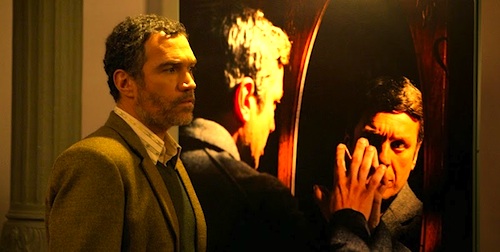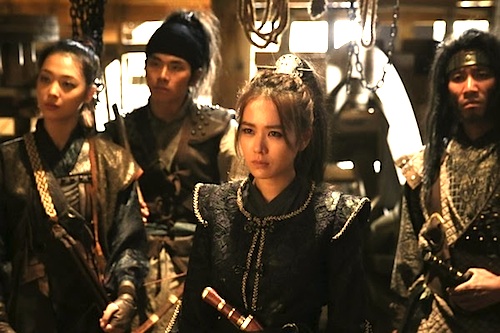By Joe Bendel. Edo Celeste’s bestselling sleuth Felipe Aranda is supposed to be the good guy, but he might be more akin to Stephen King’s Dark Half. The man who posed for a series of pictures inspired by Celeste’s books seems to take the role way too seriously, especially when the author hints he may soon end the popular series. Celeste begins to suspect the man of crimes both new and old in Javier Fuentes-León’s The Vanished Elephant, which screens during the 2014 Toronto International Film Festival.
The one case the ex-cop turned mystery novelist never cracked was the 2007 disappearance of his fiancée Celia Espinoza. The timing was particular unfortunate, occurring during an earthquake that rocked coastal Peru. It turns out it also coincided with the presumed death of Mara de Barclay’s first husband. Celeste was blissfully unaware of this fact until the remarried Barclay had her strong arm servants arrange a meeting. She was rather baffled to receive an envelope addressed to Celeste bearing her supposedly late husband’s handwriting.
The assortment of cryptic photographs inside does not immediately stimulate Celeste’s curiosity, but he will get to them in good time. However, he is instantly struck by Rafael Pineda, the tough talking model, who is a perfect dead ringer for the Aranda Celeste he always imagined. As he investigates the shady Pineda, events start to parallel his Aranda novels, including the one he is currently writing.
How much viewers will enjoy Elephant depends on what they value most in mystery-thrillers: the structure and conventions, or the trappings and atmosphere. Fuentes-León creates a terrifically moody vibe, but the film evolves into a series of increasingly intricate Lynchian mind teasers, which are quite clever if you enjoy that sort of gamesmanship. More conventional audiences should be warned, Celeste will never gather together his suspects to give them the “I suppose you’re wondering why I’ve called you all together” talk.
Nevertheless, there are really intriguing clues dispersed throughout the film, such as the titular subplot revolving around a pachyderm shaped rock formation in Paracas that supposedly really crumbled into the ocean during the earthquake, but remains unconfirmed by google. There are similarly strange bits and pieces that stick in your head even more than the grand revelation it all builds towards.

Salvador del Solar might set a new world’s record for jaded world-weariness as the haggard Celeste. He convincingly carries himself like an ex-cop and looks reasonably intelligent doing some reckless things. Likewise, Lucho Cáceres projects the right sort of vague, hard to define menace as Pineda (or should that be Aranda).
While Fuentes-León’s feature debut Undertow was quite a nice little film, nothing about it would lead viewers to expect a follow-up like Elephant. He smoothly stages some remarkably complicated scenes, while maintaining a satisfyingly noir vibe. Cinematographer Mauricio Vidal gives it all a soft, mysterious look, while art director Susana Torres provides a lot of cool stuff, like a painting of the Vanished Elephant. It all makes for quite an effectively strange film. Recommended for mystery fans with a taste for postmodernism, The Vanished Elephant screens again Sunday (9/14) during this year’s TIFF.
LFM GRADE: A
Posted on September 9th, 2014 at 4:32pm.


